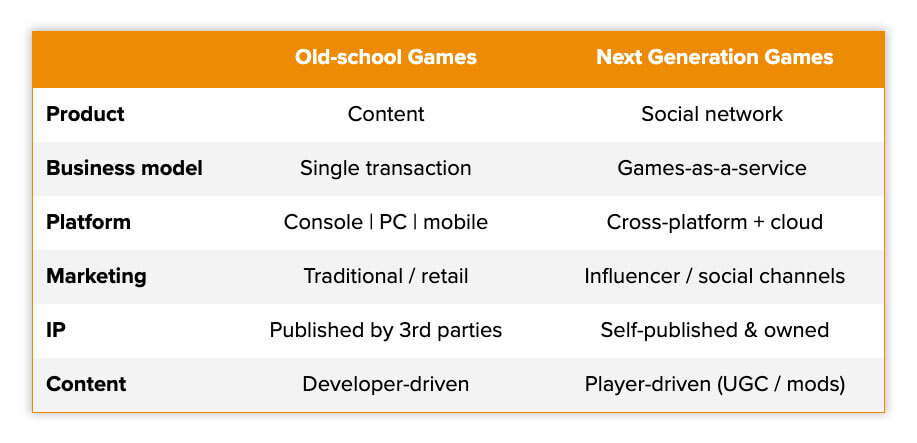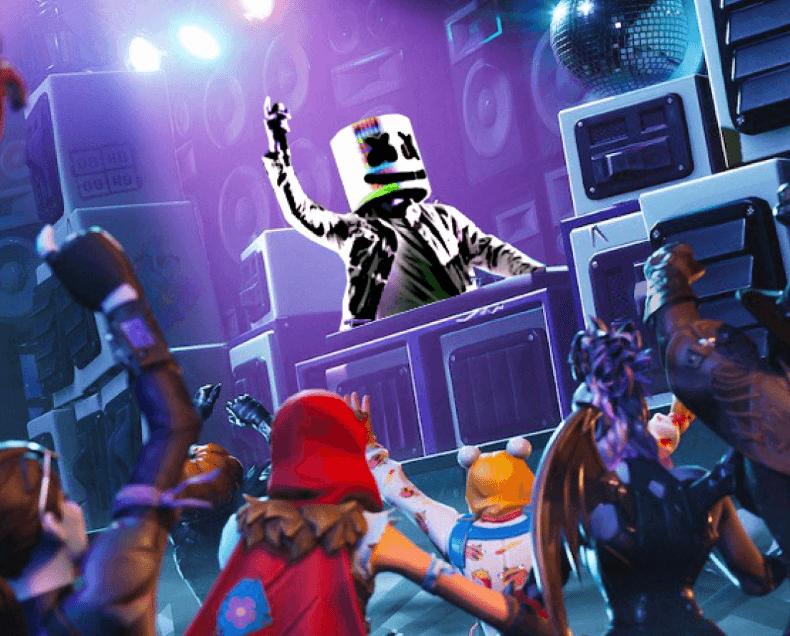Games have come a long way since Pong. Consisting of a single white pixel bouncing across the screen—a crude simulation of table tennis—the 1972 arcade classic was the nascent gaming industry’s first hit.
Since then, games have grown from a niche hobby into a dominant force in the entertainment industry. Last year, Rockstar’s Red Dead Redemption 2 grossed $725 million in its opening weekend, eclipsing Hollywood’s weekend box office record: the $640 million blockbuster Avengers Infinity War.
Next-generation games will be bigger than anything we’ve seen yet. While current multiplayer successes like Roblox tout 100 million monthly active users, new MMOs will strive for Facebook’s scale—1 billion users. That’s because the way we develop, discover, and play games is rapidly evolving. The next generation of games will differ from their predecessors in six key ways:
1. Games are the new mall (and the new sports bar)
Games are the next social network. Fortnite looks more like Facebook than it does a traditional shooter game: millions of players socialize in squads and custom games, often with no goal to win. For many, the battle royale has become secondary to the party. And that party can get pretty big—11 million people attended Fortnite’s live, in-game Marshmello concert (at right) earlier this year.
Even when not actively playing, users chat, interact, and watch others, which has propelled esports into the mainstream. The 2018 League of Legends Finals attracted 200 million viewers, more than the Super Bowl and the NCAA Final Four combined. What started as a marketing tool to engage players has become a lifestyle.
2. Games are no longer one-off “hits,” but living franchises
Games have evolved beyond Hollywood-style releases to become live services that can thrive for years. Games used to release sequels every 3 to 5 years; now live service games are updated with new content every month. These “games-as-a-service” are continually reshaped by user feedback, dramatically extending player lifetimes. League of Legends, which celebrated its 10-year anniversary this week, hit a franchise-high 8 million concurrent daily players last month. Blizzard’s World of Warcraft, a 15-year old game, set a new launch day record in August when 1.1 million players tuned into Twitch to watch the release of Classic mode.
3. Platform convergence will create massive hits
Historically, games have been segmented by platform, siloing players by PC, console, or mobile. This made it harder to play with friends and dampened network effects from multiplayer games. Today, engines like Unreal enable developers to deploy a single code base across multiple platforms. As cross-platform play becomes the new standard, multiplayer games will grow much faster and larger than older generations. Phoenix Lab’s Dauntless, for example, quadrupled its player base in three weeks when it launched PC/console cross-play. Fortnite’s 250 million player base is largely due to its ubiquitous presence on every platform.
4. Game discovery will be organic and social
Large publishers have traditionally spent millions marketing games in online ads, billboards, and TV commercials. (Remember that 2015 Super Bowl ad for Game of War with Kate Upton?) Now influencers on social channels like Twitch, Discord, and Reddit are driving game discovery. By cultivating key influencers and early adopter communities, developers will be able to self-publish instead of relying on conventional marketing tactics. This shift is already evident: the top two games of 2019, Respawn’s Apex Legends (at right) and Riot’s Teamfight Tactics, were both marketed primarily via Twitch streamers.
5. The next Marvel universe will be born from games
The next big movie franchise, theme park, or toy line will likely come from games. Players are spending thousands of hours interacting with game stories and characters, from the minute world-building of World of Warcraft to the hand-crafted narratives of Naughty Dog’s The Last of Us. As a result, many developers are moving away from a publisher-led financing model to a venture capital model that enables them to maintain ownership over their IP.
6. Consumers are co-creators
New tools empower players to create their own content in the form of mods, maps, items, or game modes. Player mods have even spawned entirely new genres: PUBG began life as an Arma 2 mod, DayZ Battle Royale, and League of Legends was heavily inspired by the Warcraft 3 mod DOTA. User generated content allows games to scale quickly and cost-effectively—rather than building everything in-house, developers can turn the keys over to the community. UGC also has the potential to go viral. A video of a player recreating the Star Trek Enterprise in Minecraft, for example, racked up nearly 13 million Youtube views.
The Long View
In our view, next generation games will grow faster and larger than today’s hits, fueled by network effects from platform convergence, organic social discovery, and user-generated content. These games will be truly global, connecting players around the world. And as the live service model becomes increasingly common, successful franchises will flourish for decades as both entertainment and social hubs.
At a16z, we believe the games industry is in the midst of a tectonic shift. Better yet, we believe that we’re still in the early stages of that transition, as technologies like cloud streaming, blockchain computing, and 5G emerge. It’s why we’ve invested in companies like Bonfire Studios, Singularity 6, Oculus, and Improbable, and why we’ve built a dedicated games team to lead our strategy going forward, with a focus on seed and Series A rounds.
We’re really excited about the future of games and look forward to partnering with companies and founders who share our vision.
-

Jonathan Lai is a general partner and founding investor of A16Z GAMES at Andreessen Horowitz, where he focuses on investing at the intersection of games and consumer, social, web3, infrastructure, and fintech.
-

Andrew Chen is a General Partner for A16Z GAMES, focused on the intersection of tech and gaming — this includes AI, studios, infrastructure, and consumer apps.




